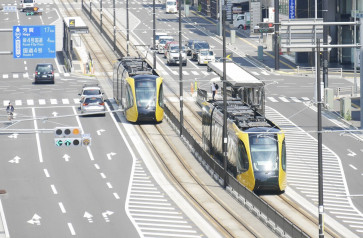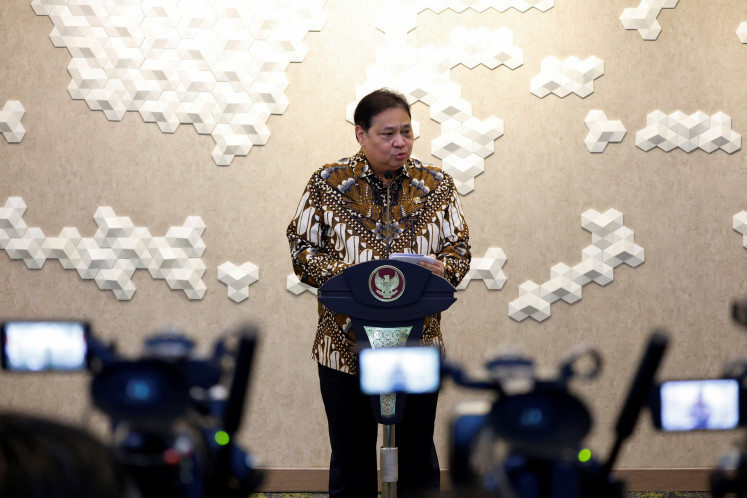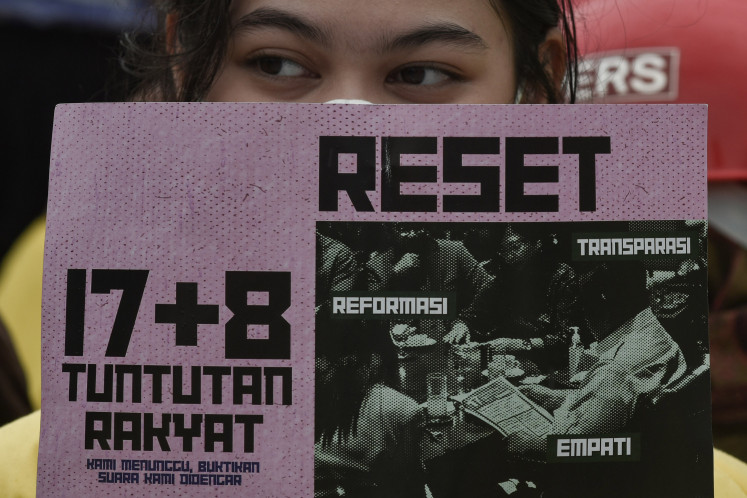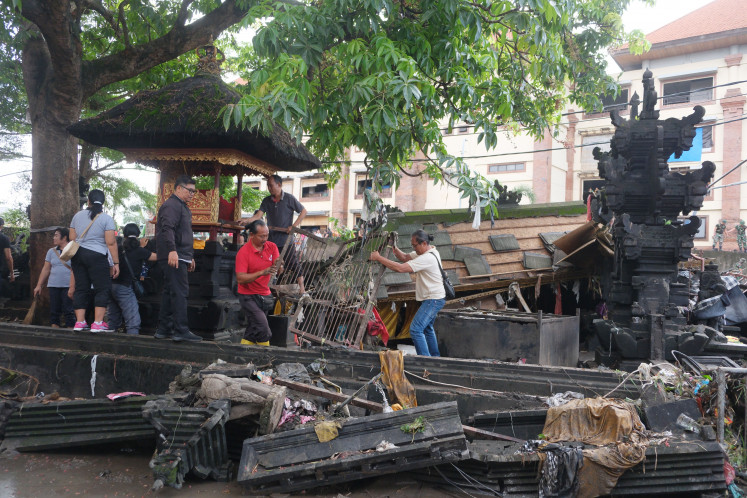Popular Reads
Top Results
Can't find what you're looking for?
View all search resultsPopular Reads
Top Results
Can't find what you're looking for?
View all search resultsLower emissions? Not just yet
The long-list of participants at a preliminary gathering of construction and mining exhibitors reflected the sheer need “to keep factories busy”, in the words of one company representative, instead of trying to profit
Change text size
Gift Premium Articles
to Anyone
T
he long-list of participants at a preliminary gathering of construction and mining exhibitors reflected the sheer need “to keep factories busy”, in the words of one company representative, instead of trying to profit.
While businesses say they are “waiting for China to wake up” and resume its high demand for coal again, Indonesia offers the attractive prospect of the need for large capacity heavy equipment as it is among the largest markets for bulldozers, says the CEO of the Poland-based company Dressta, Leslaw Holysz.
All manners of earth moving equipment are needed for Indonesia’s infrastructure projects, apart from its open pit mining, plantation and forestry sectors.
Indonesia and other Asian nations also provide the much less worrying enforcement and regulations on environmental standards when compared to Europe’s high standards and continued high costs of green technology.
Despite the many policies and agendas agreed on to mitigate climate change across the European Union and ASEAN, economic needs on both sides are still drawing the mining and related industries to huge markets with weak environmental regulations and enforcement.
A researcher on the Asia Pacific region, Jörn Dosch, noted in 2011 how an ASEAN agreement on cross boundary haze, the annual source of frustration for residents of Singapore, Malaysia and nearby parts of Indonesia, was signed in 2002 but remained unratified only by Indonesia, an ASEAN cofounder and biggest member, because of vested interests in mining and forestry businesses among politicians in Sumatra and Kalimantan.
To keep up with Europe’s environmental standards, many firms claim that the latest developments in their machinery produce lower emissions and allow for lower costs to producers.
Bauma’s April exhibit will open with the awarding of its regular Innovations Award, presented for the 10th time. The nominees have been announced for innovations in machinery, machinery components, construction work, research and design of earth moving equipment.
The jury evaluates nominees based on their innovations in producing environmental-friendly equipment, “humanization of the work place”, economic benefit and performance.
Highlighting cost effective innovations are crucial to businesses seeking to comply with tighter environmental standards.
The use of such green machinery across Indonesia’s construction and mining projects would fall in line with the nation’s ambitious target of a 26 percent reduction in greenhouse gas emissions by 2020, as stated in 2009 by President Susilo Bambang Yudhoyono. However, supply of low lead fuel is one problem in far flung areas where projects and operations are located, and foreign firms often provide at least two types of machinery to enable operations in Indonesia. Indonesia’s difficulty in reconciling its economic growth and commitment with a cleaner environment is shared by many other nations.
Economic growth in Asia is largely still driven by coal either for domestic consumption or for export, mainly to China and India, currently the regions leading coal guzzlers. The International Energy Agency cites that China’s coal demand tripled from 600 million tonnes of oil equivalent (25 exajoules) in 2001 to 2011; and that by 2017 India could become the world’s second-largest coal consumer, replacing the USA, The Economist reported.
The mining and related businesses expect increased demand despite local residents’ complaints of water contamination, rice fields affecting volume, harvest quality and health complaints such as in areas around mines in Kalimantan.
As Bauma organizers note, Indonesia is already the world’s largest exporter of coal for power stations. Currently yielding 340 million tonnes, expected growth is some 500 million tonnes by 2020, “given rising demand from Asian neighbors and Indonesia’s own need for its electricity suppliers.”
Given the high demands for coal in the domestic and international market, Indonesia’s vast infrastructure needs and weak enforcement of its environmental commitments, both environmentalists and the business circle have warned that on the national scale, few companies would have the capacity to operate under greener standards in a few years’ time.
There are meager incentives for miners and builders to go green. However, the Indonesian markets paint a very welcoming picture. In addition, the President’s statement regarding our national commitment to reduce harmful emissions by 26 percent in eight years time sounds like a lot of hot air.
Organizers remain upbeat: Eventually Indonesia will see that green standards create a more competitive edge, says the chief representative of Messe Muenchen, Wolf-Dietrich Mueller.
Bauma’s innovation winners are expected to contribute to the increased awareness of the feasibility of greener technology in heavy equipment and in the extraction and processing of minerals.
Guenter Kuenze, a professor at the Technical University of Dresden, noted that it took “even the pioneer of hybrid design — Toyota — more than 10 years” to gain market acceptance. He told organizers that developments in mobile working machinery would be much slower compared to that of the automotive sector, among others, given their diversity and long lifetimes.
Meanwhile, machinery export is even more crucial for surviving the European downturn, said managing director Jorege C. Dastis of ANMOYC, an association of Spanish manufacturing and mining equipment comprising 90 members.
Thus the world’s exporters of bulldozers, which must keep their factories busy, will focus on large appealing markets while their countries hunt for ways to make and support cheaper green technology.










